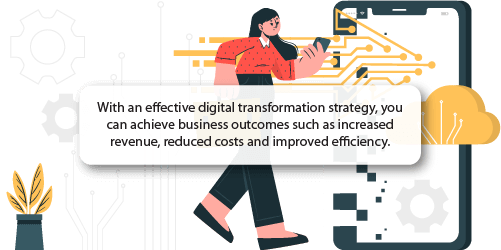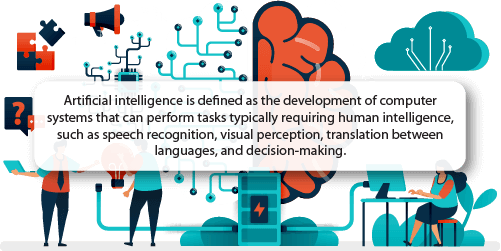The retail industry is undergoing a complete transformation. The digital revolution has changed the way customers shop and pay for goods. Businesses are developing new strategies and methods to maximise customer satisfaction and grow sales. To remain competitive, you must stay on top of the latest trends in digitisation and embrace advanced technology.

That can include voice assistants and augmented reality to provide an exceptional customer experience while maintaining a healthy bottom line. But what does that look like for you and the future of the retail industry?
What is digital transformation in retail?
Digital transformation is a highly strategic process for applying fundamental changes to all areas of your business. This transformation involves using digital technology to change your business model, how you create value, and how you deliver it to add more value to your business.
To determine a successful digital transformation strategy, you should ask yourself three questions:
- What strategic challenges do you want to solve?
- How will you leverage retail technologies to solve those challenges?
- Who are your customers, and how can you engage with them in ways that add value?
The power of digitalisation in the retail industry can help you create more meaningful and relevant relationships through a greater understanding of customer preferences, behaviours, and needs.
Once you understand what your customer wants from you, you can use digital tools and resources to deliver swift and easy interactions with them - in a way that creates value for them and you.

What are the benefits of digital transformation drivers in the retail industry?
The power of automation
Large corporations and retail enterprises have been implementing digital transformation to improve their corporate effectiveness and competitiveness. They use automation to reduce operating costs, empower employees, increase revenue, speed up product development, and enhance customer experience.
The rise of artificial intelligence (AI) and machine learning technologies means that machines are becoming smarter, more efficient, and more productive.
You can use automation to digitise processes and make them more efficient by creating tools that can eliminate repetitive tasks and predict when rare events will occur so you can predetermine them.
Operations optimisation
With digital transformation for retail being instrumental in helping you to embrace new business models and compete online, it can also deliver significant performance improvements in areas like supply chain management, inventory management, and access to information.
By accessing real-time sales data, you can improve your sales forecasting and make better decisions about inventory. You can also improve operations efficiency by leveraging existing data assets across channels to gain more valuable insights into consumer patterns.
Improved customer experience
Now that consumers have grown more accustomed to accessing information on the internet, they expect instant gratification and responsiveness from you. With the rapid transformation of tech in the retail industry to accommodate digital technologies, you can use a customer relationship management (CRM) system to make the most of your business.
A CRM system can provide a wealth of information, insight, and understanding to help you better communicate with customers and deliver a more efficient, cohesive company-wide customer experience.

A CRM system can also enable you to provide personalised customer interactions by collecting data and tracking customer behaviour. With real-time feedback, you can proactively address customer concerns and boost the overall satisfaction of your customer base.
Get insight into buyer preferences
The retail market is in the midst of digital transformation. It involves adopting new technologies and leveraging big data analytics to gain more insight into customer behaviour, which allows you to take targeted and personalised customer engagement to a new level.
To be among the retail industry's top players, you must know what your customers want. It is why digital transformation for retail is so significant since it gives you a peek into customer intentions and preferences.
By turning these into actionable insights, you can deliver customised services and products and encourage repeat purchases, word-of-mouth recommendations, loyalty programs, and other positive signs that you're heading in the right direction.
Selling opportunities
As a part of your digital transformation efforts, you see a wide range of opportunities to build on your existing infrastructure and exploit new data sources. People often use their mobile devices (phones or tablets) to shop and compare different products.
You can use this to your advantage by creating an experience that will help you sell more by using a wide variety of social media platforms and creating a holistic omnichannel experience.

What are popular digital transformation trends in retail?
Digital transformation is gaining traction amongst retail companies and consumers alike. The online world is moving towards mobile, and a generation of millennials rely on automated systems to find solutions to their everyday problems.
Forward-thinking companies use technology as a competitive advantage by streamlining operations, increasing productivity, and delivering top-notch products to the market in record time.
1. Personalisation to improve customer experience
Personalisation is no longer a luxury for online shoppers; it has become necessary. Today, online retailers have started using customer data to personalise the shopping experience in many ways, including product recommendations, email marketing, targeted pop-ups and more.
Personalisation provides an opportunity for you to connect with your customers more deeply. Besides, personalised content creates a more meaningful and authentic interaction, ultimately increasing conversions and sales.
2. Search engines
Google and other search engines are gaining more influence over the web. Indeed, you’ve surely noticed that Google’s role in determining quality content has become predominant. Google has a series of ranking factors that look at how well your retail site matches user intent.
Additionally, along with focusing on your SEO to attract customers to an eCommerce business, marketers must now ask themselves how they can give the audience the best online experience possible.
Google’s new Page Experience algorithm is a significant change to search results. This update focuses on website pages and their speed, usability, and security scores to provide the best user experience for customers.

Google has also developed a separate technology called “MUM”. It improves the quality of query answers by conducting deep searches across content such as images, videos, text documents, etc. MUM aims to provide customers with rich and nuanced explanations to tough queries with multiple forms of content.
To stay on top of ranking performance and build data-driven marketing and SEO strategies, a comprehensive all-in-one solution like SE Ranking software is essential. It features a hub for every major aspect of your website and business. From keywords to link building and everything in between, this SEO platform tracks the most significant metrics, analyses your competitors' campaigns, helps to create quality content and streamlines data analysis for several other online activities.
3. Omnichannel
Companies across all industries have begun to adopt a digital transformation strategy to enter the market today and remain competitive tomorrow. To stay ahead of the competition, they follow an omnichannel approach that provides customers with a seamless experience.
Omnichannel retailing is an increasingly popular retail strategy where you connect and synchronise your business interactions with customers via different channels like emails, social media, websites, and more. Based on the data gathered from each channel, you can make decisions, improve customer relationships, and ultimately drive sales.
4. Big data
Never in the history of retail have companies gained such a deep understanding of customer behaviour, trends, and patterns. Businesses have been tapping into the power of big data for some time, but only recently has it become accessible to issue analysis.
You can use big data analysis to drive innovation and growth, bolster your analytics-based decision-making, simplify processes, and leverage valuable insights to drive more sales.
5. Artificial intelligence
At its most basic level, artificial intelligence is about making smarter decisions by automatically analysing large amounts of data quickly and accurately.

For example, AI can help you make informed decisions about your inventory levels or effectively target a marketing campaign to customers who are more likely to convert. AI can even assist with customer service and answer customers' common questions via chatbots.
In the past few years, it's been said that artificial intelligence (AI) will play a significant role in transforming businesses. As technology advances, AI can improve accuracy and perform large tasks quickly, removing human error and the need for human oversight.
6. Augmented reality
Augmented reality (AR) is changing the way we do business. From entertainment to mobile commerce, AR is constantly evolving thanks to advanced tech and increasing demand for more value and less fluff.
Augmented reality is a technology that integrates virtual and digital items into the real world. It allows your customers to interact with virtual items like real products. This technology is quickly becoming popular and you can use it to improve the customer experience while encouraging more sales.
Think about how often you’ve made an impulse purchase and regretted the decision because the item didn’t fit your interior. Imagine an application that allows you to view your products in your home before you purchase them or even see what they look like when you wear them or place them in your rooms.
That is what augmented reality offers you. AR is used to create a kind of ‘try before you buy’ situation, which lets your potential customers test whether a product will fit in their lives.
7. Internet of Things
The Internet of Things (IoT) has its tentacles in almost all industries. You can find it in healthcare, manufacturing, retail, transportation, and more. It is a wide-scope technology that includes many things; however, most IoT devices fall under sensors and RFID tags.
Such technology enables real-time tracking of your inventory and other physical objects. It also helps you to make more informed decisions about your businesses.
For instance, if you run an online fashion store, you should know the revenue generated by each colour on your site. It will help you to adjust your product range and make your online store more profitable.
8. Blockchain
Businesses are steadily adopting blockchain due to its improved security, transparency, and efficiency. It provides a tamper-proof record of transactions while eliminating the need for third-party intermediaries, such as a bank, through a ledger (digital or physical) that can keep track of transactions between two or more parties over time.
This technology underpins Bitcoin, Ethereum, and other cryptocurrencies, but you can use it for far more than just digital payments. It has now made its way into the retail sector in areas like supply chain management, loyalty programmes, product tracing, and more.

Conclusion
Digital transformation in retail is a term that has been around for quite some time but has only recently hit the mainstream. Rather than being an isolated event, digital transformation for retail has since evolved into a broader concept that involves change at the core of any organisation.
With just about every business and industry, including retail, embracing digital in one way or another, there is no reason why you shouldn't welcome it too.



